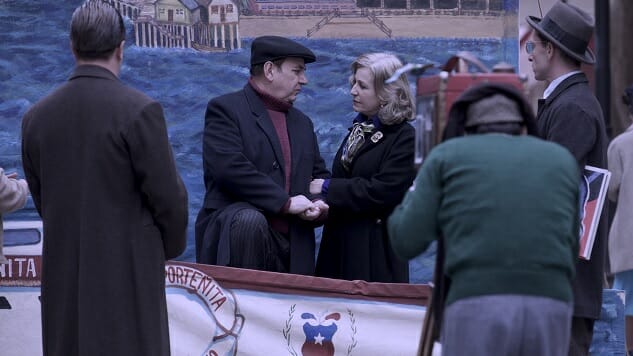Neruda

The truth about Pablo Larraín’s Neruda is that you’ll learn very little about the subject of its title, the Chilean poet-diplomat and politico Pablo Neruda. You won’t learn much about the context in which Larraín has set the film, either, though he lays out the basic, barest details at the start for our edification. You will, however, appreciate being swept up in Larraín’s impressionistic interpretations of Neruda’s humanity and his flight and exile from Chile in the late 1940s, because if Larraín is good at anything, it’s drilling all the way down to the cores of very real people through witty mythologizing, as proven in his second (and by far more major) December release, the Jackie Onassis biopic Jackie.
Neruda is cut from the same creative cloth as that film despite the gulf of cultural and political differences that separate the two. They’re both biopics that dare to break from formula, eschewing the basic structure and expectations of the category to be artsy fartsy and, in the case of Neruda, willfully elliptical as well. The script, written by Guillermo Calderón (who also wrote the script for February’s The Club, the first Larraín movie to hit theaters in 2016), is loaded with flowery declarations that ring with profundity but little clarity. (“Being with you is beautiful,” a character proclaims at one point. “It’s like living on a tree-lined street.” The turn of phrase delights the ear as much as it boggles the mind.) It’s stuff and nonsense, and yet all of that stuff and nonsense is precisely what makes Neruda, a living poem given shape and form through cinema, so darn good.
A bit of basic, boiled-down context for the film’s narrative: In 1946, Gabriel González Videla, the presidential candidate for Chile’s Radical Party, courted the Communist Senator Neruda to act as his campaign manager, and Neruda, understandably comfortable with the support shown Videla from the country’s left wing, accepted. After Videla won the election, though, he quarreled with the Chilean Communist Party, first expelling them from his cabinet, then banning them entirely via the Permanent Defense of Democracy Law, going so far as to round up miners participating in a Communist-led strike in 1947 and lock them away in concentration camps. Larraín doesn’t delve too explicitly into these events with Neruda, mostly because they occur off-screen before the film begins, but sociopolitical anxiety hangs over his plot nonetheless.
Larraín is chiefly interested in staging the “fabulous chase” Videla’s government embarked on to capture Neruda (played by Luis Gnecco), who went on the lam with his wife, Delia del Carril (Mercedes Morán), and stayed there for a year and some change before he left the country and made tracks for Paris. This is appropriate to Larraín’s sentiment toward the biopic: Rather than tell a great or famous person’s entire life story, condensed down to two hours, he instead recreates a specific time in their life story, and so his plots breathe more than the standard issue fare that makes up the bulk of the biopic category. It helps, too, that Larraín is enigmatically inclined, and that Neruda by its very nature embraces both mystery and allusion. By consequence you will, as the story expands, wonder how much to trust our narrators, not just Larraín but also one Oscar Peluchonneau.
-

-

-

-

-

-

-

-

-

-

-

-

-

-

-

-

-

-

-

-

-

-

-

-

-

-

-

-

-

-

-

-

-

-

-

-

-

-

-

-








































